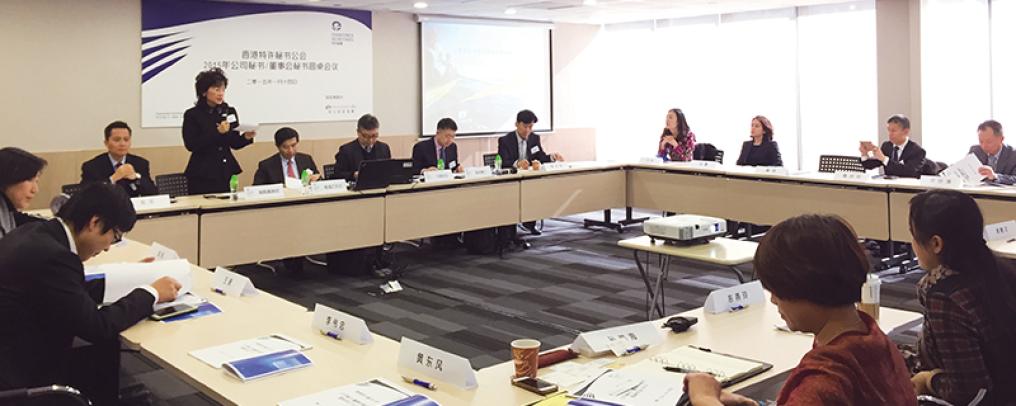It has been a year since the new Companies Ordinance, Chapter 622 of the laws of Hong Kong, came into operation. In this article, the Companies Registry describes the transition to the new regime and highlights some of the more commonly raised issues arising from the implementation of the new law.
The new Companies Ordinance, which commenced operation on 3 March last year, provides a modernised legal framework for the incorporation and operation of companies in Hong Kong and reinforces Hong Kong's role as an international financial and commercial centre.
The main objectives of the new Ordinance are to enhance corporate governance, facilitate business, ensure better regulation and modernise Hong Kong's company law. Key initiatives for achieving these objectives include:
- clarifying the standard of director's duty of care, skill and diligence with a view to providing guidance to directors on their duties under the law
- fostering shareholder protection, such as introducing more effective rules to deal with directors’ conflicts of interests and requiring disinterested shareholders’ approval in the case where shareholder approval is required for transactions of public companies and their subsidiaries
- allowing companies that meet specified size criteria to prepare simplified financial statements and directors’ reports, and
- abolishing the memorandum of association, the company seal and the par value of shares.
Transition to the new regime Migration to the new regime has been smooth. This is best exemplified by the high usage rates of the newly specified forms. In the first week of implementation, over 99% of companies used new forms for submitting incorporation applications. For other forms, a three-month transitional period had been provided from March 2014 for the filing of new forms. However, by May 2014, over 80% of the statutory forms received by the Registry were in the new format. Upon the expiry of the transitional period in early June, the usage rate of new forms, out of a pool of over 10,000 documents received daily, was close to 100%.
Internally, the revamped information system of the Registry has also been running smoothly, fully supporting the Registry's new roles and functions under the new Ordinance.
Achievement of the objectives
One of the main objectives of the new Ordinance is to facilitate business operation and cater for the needs of SMEs. The achievement of this objective may best be exemplified by the following statistics (for the period from 3 March to end December 2014):- around 55% of the new companies incorporated electronically adopted the sample articles of association provided at the e-Registry (www.eregistry.gov.hk)
- 127 applications for restoration of companies to the Companies Register using the administrative restoration procedure were received, which represented about 44.4% of the total number of applications for company restoration.
- 92 out of 102 companies which reduced their capital made use of the alternative court-free procedure; this also represented a six-fold increase in the total number of companies which have reduced their capital, from 14 in 2013, and
- 10 groups of companies have undergone amalgamation through the new court-free procedure.
Given the new powers of the Registrar of Companies under the new Ordinance, the Registry has set up a new Inspection Unit in its Enforcement Section to conduct checks and site visits of registered office addresses of companies. We have been able to devote more resources to step up our enforcement efforts for non-filing offences. Recently, we have issued 83 summonses against 11 related companies and their directors for failing to hold AGMs and lay accounts before AGMs.
Promoting good corporate governance has always been a priority for the HKSAR government. In the World Bank's Doing Business 2015 report, Hong Kong is ranked the world's number three in terms of the ease of doing business. Most notably, our ranking in protecting minority investors has risen from third to second this year. The World Bank commends Hong Kong for strengthened minority investor protections by introducing requirements for directors to provide more detailed disclosure of conflicts of interest to other board members under the new Ordinance.
Implementation issues
We have received enquiries from stakeholders on issues relating to the implementation of the new Ordinance. The more common ones which call for clarification are highlighted below.Company Seal
As an initiative to facilitate business operations, the new Ordinance has abolished the mandatory requirement for a company to have a common seal and has made the keeping and use of a common seal optional. A company may now, without using a seal, execute a document by having it signed by its officers (namely, by two directors or by a director and the company secretary or, in the case of a company with only one director, by the sole director) and, in the case of a deed, by having it so signed and expressed to be executed by the company as a deed and delivering it as a deed.
It follows that the requirement under the Conveyancing and Property Ordinance (Cap 219) of executing a deed for the creation, extinguishment and disposal of any legal estate in land may be satisfied by the company executing the relevant assignment, mortgage, charge, lease etc, as a deed in accordance with the new provisions without using a seal. Likewise, other documents which are required to be executed as a deed (such as a deed for the grant of a power of attorney) may now be executed by a company as a deed without using its common seal.
Business review
The new Ordinance requires public companies and companies not falling within the reporting exemption to prepare, as part of the directors’ report, a more analytical and forward looking business review. A private company that does not fall within the reporting exemption need not prepare a business review if it has members’ approval of a special resolution passed by 75% of its members. The special resolution must be passed at least six months before the end of the financial year to which the directors' report relates.Accounting reference period and first financial year
Although the new Ordinance commenced operation on 3 March 2014, many of the requirements in the new Ordinance (for example in relation to accounting records, simplified reporting and financial statements) apply to a financial year that begins on or after commencement of the new Ordinance. Companies have to pay particular attention to the provisions on the determination of the first financial year. A company's first financial year after the commencement of the new Ordinance begins on the first day of its first accounting reference period and ends on the last day of that period. For an existing company, the first accounting reference period begins on the day immediately following its primary accounting reference date and ends on the first anniversary of that date. In determining the first financial year, the previous set of accounts of an existing company is relevant. If the accounts for the relevant financial year have not been prepared, nor provided to the members, there is a default provision under which the primary accounting reference date is determined.Delivery of annual returns
Under the new Ordinance, an annual return of a public company or a guarantee company is required to be delivered, together with certified true copies of the relevant financial statements, directors’ report and auditor's report, within 42 days after the company's return date, that is, six months (for a public company) or nine months (for a guarantee company) after the end of the company's accounting reference period. For a public company or a guarantee company registered under a former Companies Ordinance, the new requirements apply to the first financial year of the company that begins on or after the commencement date of the new Ordinance and all subsequent financial years. For example, if a guarantee company prepares its financial statements up to 31 March every year, its first annual return to be delivered under the new Ordinance shall be within 42 days from 31 December 2015. For a public company or a guarantee company incorporated and registered under the new Ordinance, the new requirements apply in respect of the filing of the first and subsequent annual returns of the company.
The directors of guarantee companies have to pay particular attention to the requirements under the new Ordinance as guarantee companies now form a separate category of companies and they are generally treated in the same way as public companies. In particular, the late delivery of annual returns will be subject to an escalating scale of annual registration fees.
Disclosure of company names
The Companies (Disclosure of Company Name and Liability Status) Regulation (Cap 622B) sets out the requirements for disclosure of company name and liability status to provide protection for persons dealing with a company. We have issued an External Circular (No13/2014) to clarify that it is sufficient for a company with bilingual names to display or state either the English name or the Chinese name in the manner described in the provisions. The disclosure requirements will also be complied with if such a company displays or states both the English name and the Chinese name.Way Forward
The next legislative amendment that affects the new Companies Ordinance relates to the Securities and Futures and Companies Legislation (Uncertificated Securities Market Amendment) Bill 2014 which was introduced into the Legislative Council in June 2014. A Bills Committee has been formed to scrutinise the Bill. The Bill seeks to amend the Securities and Futures Ordinance (Cap 571), the new Companies Ordinance and other enactments to facilitate the establishment and implementation of an uncertificated securities market regime in Hong Kong. Under the Bill, new provisions, including provisions relating to the register of members, registration of allotment of shares, the issue of share certificates and the delivery of instruments of transfer, will be introduced to facilitate the implementation of the proposed regime. The effect is that the proposed regime, upon its implementation will allow legal ownership in prescribed securities that are listed (or to be listed) on a recognised stock market to be held and transferred without paper documents. The new regime would co-exist with the existing paper-based securities market regime.
The government has also conducted a public consultation on a regime for open- ended fund companies in Hong Kong. The next step is to formulate the legal framework to introduce open-ended fund companies to facilitate the setting up of investment funds. Meanwhile, we will continue to monitor any issues arising from the implementation of the new Companies Ordinance.
Companies Registry, HKSAR Government
SIDEBAR: Implementing the new Companies Ordinance: Companies Registry initiatives
Since the enactment of the new Companies Ordinance, the Companies Registry has undertaken preparatory work on various fronts with a view to achieving a smooth transition for all concerned. This includes:
- issuing 16 external circulars and four guidelines to elaborate on specific aspects of the new Ordinance
- specifying 83 forms for use under the new Ordinance and nine forms for use under the Companies (Winding Up and Miscellaneous Provisions) Ordinance (Cap 32)
- revising all information pamphlets and guidance notes on application procedures to reflect new statutory requirements, and
- organising internal briefings and compiling internal guidelines and procedural notes to ensure that all Registry staff are fully equipped to carry out their new duties and handle enquiries under the new Ordinance.
In addition, a comprehensive publicity campaign was launched • to enhance public awareness of the implementation of the new Ordinance and the major changes brought about by the new law. This includes:
- setting up a dedicated thematic section on the Registry's website to provide briefing materials on all 21 parts of the new Ordinance and the 12 pieces of subsidiary legislation – other information provided includes highlights of key changes, answers to frequently asked questions, reference tables, transitional arrangements and new forms
- sending circular letters and information pamphlets to over one million companies registered on the Companies Register
- answering over 60,000 public enquiries on matters relating to the new Ordinance with the addition of a dedicated hotline, and
- organising and participating in over 70 briefings and seminars to brief relevant stakeholders, including members of professional bodies, business organisations, tertiary institutions, other government departments and the general public, on the major changes.



